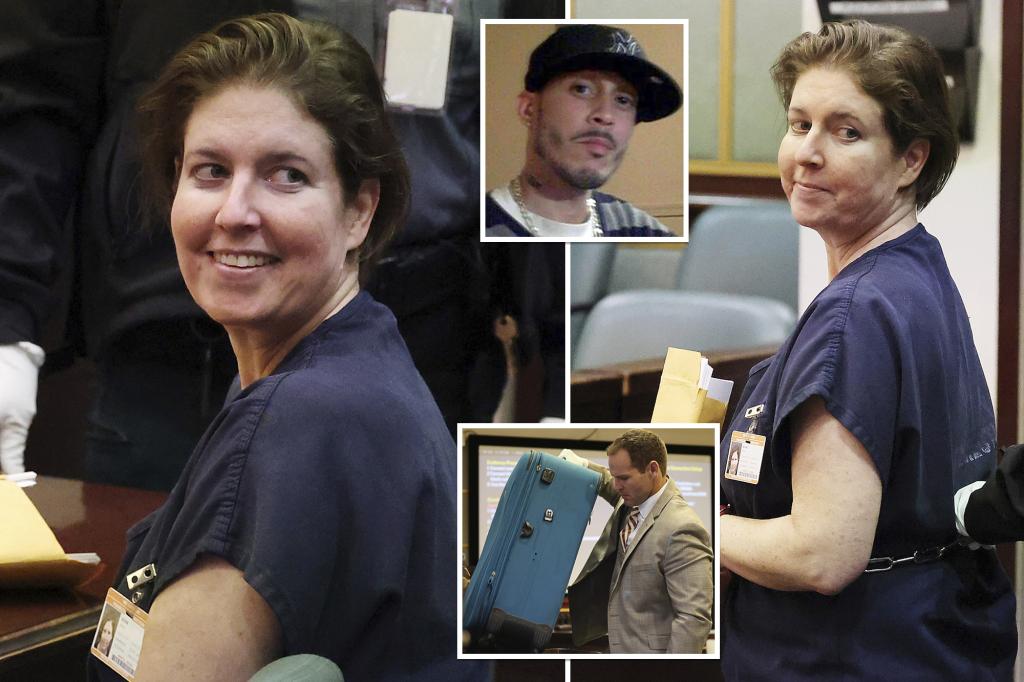In a harrowing case that has captured public attention, Sarah Boone, a 47-year-old Florida woman, was sentenced to life in prison for the murder of her boyfriend, Jorge Torres Jr., in February 2020. Boone’s conviction for second-degree murder followed a disturbing incident in which she trapped Torres, 42, inside a suitcase, recorded a taunting video while he suffocated, and then left him to die overnight. Circuit Judge Michael Kraynick handed down the sentence as Boone maintained a smile in the courtroom, reflecting a chilling indifference to the gravity of her actions.
During the 10-day trial that culminated in her conviction, Boone’s defense hinged on her claims of having suffered from “battered spouse syndrome,” arguing that her relationship with Torres was abusive. She described a pattern of violence and manipulation, alleging that Torres had subjected her to physical and emotional abuse throughout their time together. Boone claimed that despite being victimized, she harbored feelings for him and sought forgiveness for her role in his death. This complex defense ultimately failed to resonate with the jury, which deliberated for just 90 minutes before arriving at a guilty verdict.
The impact of Torres’ death rippled through his family, who attended the sentencing to vocalize their grief and the profound loss they experienced. Several relatives shared their emotional turmoil and highlighted the devastating void left behind. His mother, Blanca Torres, poignantly expressed her sorrow, noting her longing for her son’s presence and affection while one of his daughters, Anna Victoria Torres, spoke candidly about her ongoing struggles with chronic depression and anxiety in the aftermath of her father’s murder. The family’s testimonies underscored the broader social implications of Boone’s actions and emphasized the ripple effects of such violence on loved ones.
The tragic events leading to Torres’ death began on a night filled with drinking and a seemingly playful game of hide-and-seek. The game took a dark turn when Torres hid inside the suitcase, which Boone subsequently zipped shut. Despite his desperate pleas for release, she recorded him being suffocated and drew a disturbing parallel between his suffering and her own feelings of betrayal. In the videos Boone recorded, the victim’s cries were met with callous responses, encapsulating the dynamic of their relationship and the chilling reality of Boone’s actions that night. By the next morning, it was too late; Torres had suffocated to death, leaving behind an undeniable horror.
As Boone attempted to defend her actions by claiming that she believed he would free himself, the court was unconvinced by her narrative. Her initial plea of not guilty followed by rejection of a 15-year plea deal further complicated her legal position. Even with her assertion of having been a victim of abuse, the evidence presented during the trial painted a consistent picture of malice and complicity in her boyfriend’s death. The courtroom atmosphere was heavy with emotion as family members and the legal representatives processed the disturbing actions that led to such a tragic outcome.
In her last words before sentencing, Boone expressed a mix of regret and confusion, feeling sympathy for herself while also pleading for forgiveness from Torres’ family. Her acknowledgment of her love for Torres, despite his purported monstrosities, highlighted a troubling duality in her character—she vacillated between victim and perpetrator. Boone’s case exemplifies the complexities of domestic relationships, where trauma can intertwine with violence and emotional manipulation, leaving lasting scars not only on victims but also on families and communities as a whole. The deeply tragic circumstances surrounding Jorge Torres Jr.’s death serve as a stark reminder of how quickly situations can escalate into irreversible acts of violence, echoing the need for greater awareness and intervention in domestic abuse situations.

